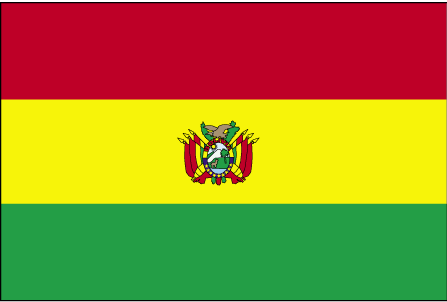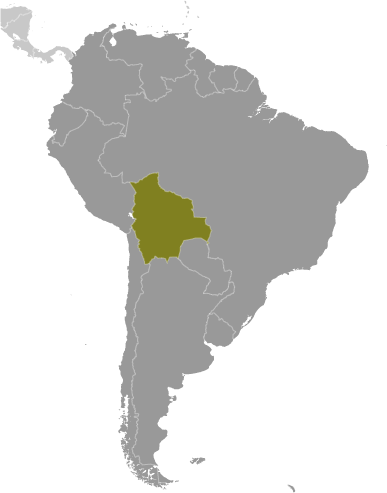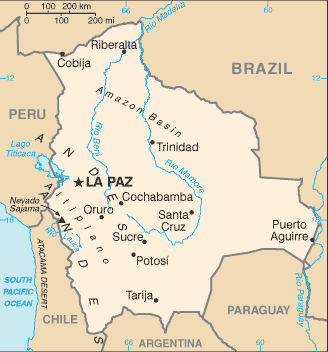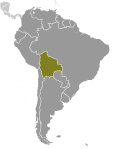
|
|
Advertisements:
GovernmentCountry name
Conventional long form Plurinational State of Bolivia
Conventional short form Bolivia Local long form Estado Plurinacional de Bolivia Local short form BoliviaGovernment type
Republic; note - the new constitution defines Bolivia as a "Social Unitarian State" Capital
Name
La Paz (administrative capital) Geographic coordinates 16 30 S, 68 09 WTime difference UTC-4 (1 hour ahead of Washington, DC during Standard Time) Note Sucre (constitutional capital)Administrative divisions
9 departments (departamentos, singular - departamento); Beni, Chuquisaca, Cochabamba, La Paz, Oruro, Pando, Potosi, Santa Cruz, Tarija Independence
6 August 1825 (from Spain)
Constitution
7 February 2009
Legal system
Civil law system with influences from Roman, Spanish, canon (religious), French, and indigenous law International law organization participation
Has not submitted an ICJ jurisdiction declaration; accepts ICCt jurisdiction Suffrage
18 years of age, universal and compulsory Executive branch
Chief of state
President Juan Evo MORALES Ayma (since 22 January 2006); Vice President Alvaro GARCIA Linera (since 22 January 2006); note - the president is both chief of state and head of government Head of government President Juan Evo MORALES Ayma (since 22 January 2006); Vice President Alvaro GARCIA Linera (since 22 January 2006) Cabinet Cabinet appointed by the president Elections President and vice president elected on the same ticket by popular vote for a five-year term and are eligible for re-election once; election last held on 6 December 2009 (next to be held in 2014) Election results Juan Evo MORALES Ayma reelected president; percent of vote - Juan Evo MORALES Ayma 64%; Manfred REYES VILLA 26%; Samuel DORIA MEDINA Arana 6%; Rene JOAQUINO 2%; other 2% Legislative branch
Bicameral Plurinational Legislative Assembly or Asamblea Legislativa Plurinacional consists of Chamber of Senators or Camara de Senadores (36 seats; members are elected by proportional representation from party lists to serve five-year terms) and Chamber of Deputies or Camara de Diputados (130 seats total; 70 uninominal deputies directly elected from a single district, 7 "special" indigenous deputies directly elected from non-contiguous indigenous districts, and 53 plurinominal deputies elected by proportional representation from party lists; all deputies serve five-year terms) Elections Chamber of Senators and Chamber of Deputies - last held on 6 December 2009 (next to be held in 2014) Election results Chamber of Senators - percent of vote by party - NA; seats by party - MAS 26, PPB-CN 10; Chamber of Deputies - percent of vote by party - NA; seats by party - MAS 89, PPB-CN 36, UN 3, AS 2; note - as of 19 January 2012, the current composition of the Chamber of Deputies is: MAS 86, PPB-CN 36, UN 3, BI 3, AS 2 Judicial branch
Supreme Court or Tribunal Supremo de Justicia (judges elected by popular vote from list of candidates pre-selected by Assembly for six-year terms); Plurinational Constitutional Tribunal (seven primary or titulares and seven alternate or suplente magistrates elected by popular vote from list of candidates pre-selected by Assembly for six-year terms; to rule on constitutional issues (at least two candidates must be indigenous)); Agro-Environmental Court (judges elected by popular vote from list of candidates pre-selected by Assembly for six-year terms; to run on agro-environmental issues); Council of the Judiciary (five judges elected by popular vote from list of candidates pre-selected by Assembly for six-year terms; to rule on ethical and administrative issues in the judiciary); Plurinational Electoral Organ (seven members elected by the Assembly and the president-one member must be of indigenous origin-to six-year terms); provincial and local courts (to try minor cases); District Courts (one in each department) Political parties and leaders
Bacada Indigena or BI; Bolivia-National Convergence or PPB-CN [Manfred REYES VILLA]; Fearless Movement or MSM [Juan DE GRANADO Cosio]; Movement Toward Socialism or MAS [Juan Evo MORALES Ayma]; National Unity or UN [Samuel DORIA MEDINA Arana]; People or Gente [Roman LOAYZA]; Social Alliance or AS [Rene JOAQUINO] Political pressure groups and leaders
Bolivian Workers Central or COB; Federation of Neighborhood Councils of El Alto or FEJUVE; Landless Movement or MST; National Coordinator for Change or CONALCAM; Sole Confederation of Campesino Workers of Bolivia or CSUTCB Other Cocalero groups; indigenous organizations (including Confederation of Indigenous Peoples of Eastern Bolivia or CIDOB and National Council of Ayullus and Markas of Quollasuyu or CONAMAQ); Interculturales union or CSCIB; labor unions (including the Central Bolivian Workers' Union or COB and Cooperative Miners Federation or FENCOMIN) International organization participation
CAN, CELAC, FAO, G-77, IADB, IAEA, IBRD, ICAO, ICC, ICRM, IDA, IFAD, IFC, IFRCS, ILO, IMF, IMO, Interpol, IOC, IOM, IPU, ISO (correspondent), ITSO, ITU, LAES, LAIA, Mercosur (associate), MIGA, MINUSTAH, MONUSCO, NAM, OAS, OPANAL, OPCW, PCA, UN, UNASUR, UNCTAD, UNESCO, UNFICYP, UNIDO, Union Latina, UNMIL, UNOCI, UNWTO, UPU, WCO, WFTU, WHO, WIPO, WMO, WTO Diplomatic representation in the us
Chief of mission
Ambassador (vacant); Charge d'Affaires Freddy BERSATTI Tudela Chancery 3014 Massachusetts Avenue NW, Washington, DC 20008 Telephone [1] (202) 483-4410FAX [1] (202) 328-3712 Consulate(s) general Los Angeles, Miami, New York, San Francisco Note As of September 2008, the US has expelled the Bolivian ambassador to the US Diplomatic representation from the us
Chief of mission
Ambassador (vacant); Charge d'Affaires John CREAMER Embassy Avenida Arce 2780, Casilla 425, La Paz Mailing address P. O. Box 425, La Paz; APO AA 34032 Telephone [591] (2) 216-8000FAX [591] (2) 216-8111 Note In September 2008, the Bolivian Government expelled the US Ambassador to Bolivia, and the countries have yet to reinstate ambassadors Flag description
Three equal horizontal bands of red (top), yellow, and green with the coat of arms centered on the yellow band; red stands for bravery and the blood of national heroes, yellow for the nation's mineral resources, and green for the fertility of the land Note Similar to the flag of Ghana, which has a large black five-pointed star centered in the yellow band; in 2009, a presidential decree made it mandatory for a so-called wiphala - a square, multi-colored flag representing the country's indigenous peoples - to be used alongside the traditional flag National symbol(s)
Llama; Andean condor
National anthem
Name
"Cancion Patriotica" (Patriotic Song) Lyrics/music Jose Ignacio de SANJINES/Leopoldo Benedetto VINCENTI Note Adopted 1852
Comments
Add a new comment: |
Advertisement
Members area
Bolivia (Sucre):
 
GPS points from Bolivia (Sucre)
|
||||||||

 Bolivia, named after independence fighter Simon BOLIVAR, broke away from Spanish rule in 1825; much of its subsequent history has consisted of a series of nearly 200 coups and countercoups. Democratic civilian rule was established in 1982, but leaders have faced difficult problems of deep-seated poverty, social unrest, and illegal drug production. In December 2005, Bolivians elected Movement Toward Socialism leader Evo MORALES president - by the widest margin of any leader since the restoration of civilian rule in 1982 - after he ran on a promise to change the country's traditional political class and empower the nation's poor, indigenous majority. However, since taking office, his controversial strategies have exacerbated racial and economic tensions between the Amerindian populations of the Andean west and the non-indigenous communities of the eastern lowlands. In December 2009, President MORALES easily won reelection, and his party took control of the legislative branch of the government, which will allow him to continue his process of change. In October 2011, the country held its first judicial elections to appoint judges to the four highest courts.
Bolivia, named after independence fighter Simon BOLIVAR, broke away from Spanish rule in 1825; much of its subsequent history has consisted of a series of nearly 200 coups and countercoups. Democratic civilian rule was established in 1982, but leaders have faced difficult problems of deep-seated poverty, social unrest, and illegal drug production. In December 2005, Bolivians elected Movement Toward Socialism leader Evo MORALES president - by the widest margin of any leader since the restoration of civilian rule in 1982 - after he ran on a promise to change the country's traditional political class and empower the nation's poor, indigenous majority. However, since taking office, his controversial strategies have exacerbated racial and economic tensions between the Amerindian populations of the Andean west and the non-indigenous communities of the eastern lowlands. In December 2009, President MORALES easily won reelection, and his party took control of the legislative branch of the government, which will allow him to continue his process of change. In October 2011, the country held its first judicial elections to appoint judges to the four highest courts.